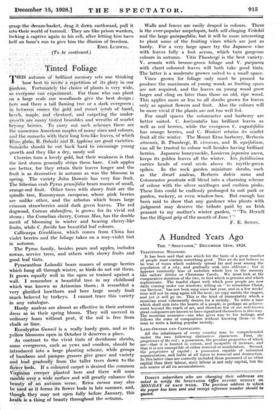A Hundred Years Ago
THE " SPECTATOR," DECEMBER 13TH, 1828.
TRADITIONAL MELODIES.
It has been said that airs which hit the taste of a great number of people must contain something good. This we do not believe to be true of tunes which suddenly spread far and near among the population of a city, and gradually sink into oblivion ; but it appears eminently true of melodies which live in the memory like sailors' ditties or Christmas Carols. We must look at the comparative duration of the two, to find which is genuine and which sophisticate. The tearful chant with which poor people are now , daily coming under our windows, telling us to remember Christ, our Saviour," has not been sung since last year, and in a few weeks' time will not be sung again till the next ; no copy assists the singers, and yet it will go on. This is the kind of immortality which a musician most vehemently desires for a melody. To write a tune which shall sink into the hearts of a people, is perhaps an achieve- ment beyond the reach of art, and therefore few of our well-known great composers are known to have signalized themselves in this way. The musician unawares—one who gives way to his feelings, and follows the rules of composition without knowing them—is the man to write a lasting popular melody.
LAND-OWNERS AND CAPITALISTS.
All the inhabitants of every country may be comprehended under the two following distinctive characters. First, the proprietors of the soil - a possession, the peculiar properties of which are—that it is limited in extent, and incapable of increase, and that it is not susceptible of either removal or annihilation. Second, the proprietors of capital ; a possession capable of unlimited augmentation; and liable at all times to removal and destruction. In this latter class are correctly included those possessed of no other: capital than their labour, since labour is not only capital, but the sole source of all its accumulations.








































 Previous page
Previous page